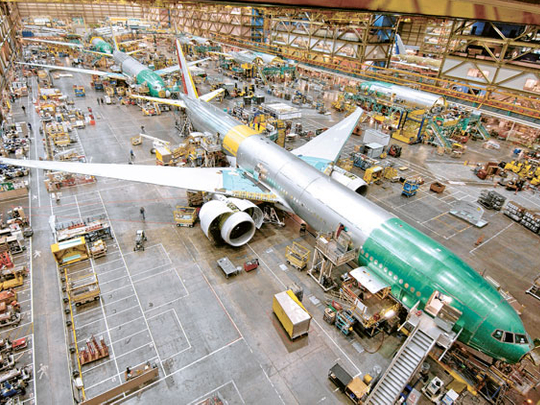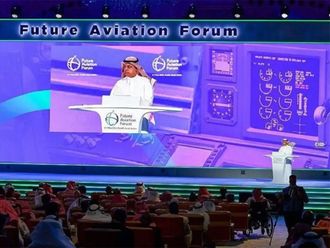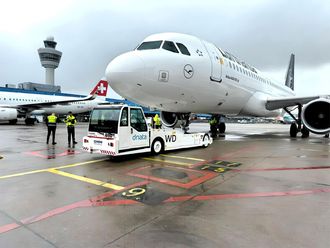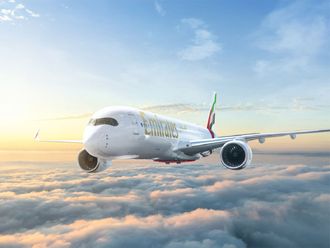
Boeing builds 1000th 777 aircraft, for Emirates
Dubai US planemaker Boeing said its workers have begun assembling the 1,000th Boeing 777 aircraft, which will be delivered to Emirates airline in March 2012.
The plane is a Boeing 777-300ER (extended range) model.
"Emirates is the largest 777 customer with 95 Boeing 777s currently in its fleet. The 1,000th 777 will be its 102nd," Boeing said in a statement issued earlier yesterday.
Emirates has more than 160 wide-body aircraft in its fleet serving a growing network of more than 115 destinations in 67 countries connecting major cities in all the six continents.
"We have continued to invest in our eco-efficient aircraft fleet, in strengthening our global route network, and also in supporting the infrastructure for our growing business — and it continues to pay off," Shaikh Ahmad Bin Saeed Al Maktoum, President of Dubai Civil Aviation and Chairman and CEO of Emirates airline and Group, said in a statement.
The aircraft's production began with the loading of the 97-foot (29.5 metre) wing spar — the main support structure for the wing — into a giant tool that automatically drills, measures and installs more than 5,000 fasteners into the spar. The spar components are built in Auburn, Washington, by Boeing Fabrication.
"We reached this milestone in only 16 years, eight years sooner than the runner-up, the 747, because of the enormous popularity of the plane among airlines that operate it, and the passengers who fly on it," said Larry Loftis, vice-president and general manager of the Boeing 777 programme.
"Sixty-four airlines have ordered 1,295 777s. The numbers prove that the 777 is the world's preferred airplane. In fact, it's preferred 1,000 times over."
Emirates' reliance on 777
Ever since 777s entered service in the 1990s, Emirates began to rely on the twin-engined jet that is more fuel efficient than rival models.
Saj Ahmad, a UK-based aviation analyst, said: "Leading the charge for Emirates' growth has been the expansion of its Airbus A380-800 and Boeing 777-300ER fleets so that fuel and emissions costs have been cut despite increases in fuel prices while at the same time leveraging its strength as a widebody, long-haul operator to launch new routes at a time when most other airlines have been reticent to do so."
The success of Boeing's 777 has forced European planemaker Airbus to abandon production of its A340 long-haul four-engine aircraft, which failed to compete with the 777.
"We have accepted reality. We have not sold any A340s for nearly two years," said Airbus finance director Hans Peter Ring.
The abandoning of the programme will allow Airbus to write back into its books a provision of €192 million (Dh960 million) it had made for the programme. The A340 first flew in April 1992 and in 1993 it scored a record for the longest non-stop flight, between Paris and Auckland, New Zealand. The Boeing 777, launched two years later and had the same capacity, but with only two engines was more fuel-efficient.
A ceremony to mark the start of production of the 1,000th B777 was held on Wednesday in Boeing's factory in Everett.
EADS announces delay in Airbus A350 deliveries
Dubai: Airbus' parent company EADS yesterday announced a six-month delay in first deliveries of its A350 long-haul jetliner but raised its outlook for the year after third-quarter profits surged.
The Franco-German group said the A350 would now enter service in the first half of 2014 rather than by the end of 2013 as previously announced. The push-back will cost it €200 million (Dh998.2 million), EADS said. It gave no reason for the delay.
Aviation analyst Saj Ahmad said: "With the Airbus A350-900 now being pushed back to the first half of 2014, a delay of a year, Emirates and Qatar Airways were right about how the programme was developing and that Airbus had not been completely open about the prospect of delays.
"This will inevitably be the first of a string of delays, led in large part to the exhaustion of buffers prior to the components being fabricated — and now that final assembly has slid, so too has the rest of the programme targets." Airbus, however, announced net profit had surged to €312 million in the third quarter, up from €13 million in the same period last year. Operational profit was down 15 per cent year-on-year to €322 million.
Net profit had more than doubled to €421 million in the first nine months of the year, it said.
EADS said it had raised its full-year operating profit forecast for 2011 to €1.45 billion, up from €1.3 billion. Revenues for 2011 are also expected to rise to four per cent compared to €45.8 billion in 2010.
Results improve
"Our nine-month results are better than expected thanks to the group's efforts to improve performance," CEO Louis Gallois said in the statement. "I am confident the commercial aircraft market combined with our strong backlog will sustain our growth in the years to come."
Gallois also said the A350 programme continues to have "our highest management attention".
The A350 long-haul twin-jet is aimed at competing with Boeing's 787 Dreamliner, which entered into service recently following a three-year delay.
Both the A350 and the 787 are made with modern composite materials, such as carbon fibre, that reduce weight and drag, leading to greater fuel economy.
The 787 made its first commercial flight last month from Tokyo to Hong Kong and will debut at the Dubai Airshow.
"All in all, for Qatar Airways in particular as the launch customer for all three A350XWB models, these delays will impact their ability to grow and the net winner out of these delays is Boeing. Their 777 is on track for a record year and will secure a raft of orders at the air show — and while Airbus gets to grips with the A350, airlines that need a lift will have no choice but to buy the 777," Ahmad said.
EADS said Airbus should deliver 520 to 530 commercial aircraft in 2011 and its gross orders should be around 1,500. Its order book has is at a record €503 billion.
— With inputs from agencies












